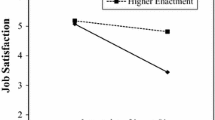Abstract
Given the well-documented impact of stress on employees, it is important to understand moderating factors, especially in behavioral health treatment settings, where constant change occurs. Staff members at four mental health (n=663) and four substance abuse (n=256) treatment agencies completed questionnaires inquiring about perceptions of direct and indirect agency changes, stress experienced due to changes, and control and input into the changes. Results revealed that as direct and indirect change increased, stress increased; as level of control and input into changes increased, stress decreased. Control and input served as a moderating variable between stress and direct change, but not for indirect change.
Similar content being viewed by others
References
Bond F.W., Bunce D. (2001). Job control mediates change in a work reorganization intervention for stress reduction. Journal of Occupational Health Psychology 6:290–302
Cartwright S., Panchal S. (2001). The stressful effects of mergers and acquisitions. In: Dunham J. (eds) Stress in the workplace: Past, present and future. Whurr, London, pp. 67–89
Cummins R. (1990). Job stress and the buffering effect of supervisory support. Group and Organizational Studies 15:92–104
Cunningham C.E., Woodward C.A., Shannon H.S., Macintosh J., Lendrum B., Rosenbloom D., Brown J. (2002). Readiness for organizational change: A longitudinal study of workplace, psychological and behavioural correlates. Journal of Occupational & Organizational Psychology 75:377–392
Elsass P.M. (1993). Job demands and job control: The effect of job design on work stress. Dissertation Abstracts International, 53(12-A): 4386
Greenglass E.R., Burke R.J. (2000). Hospital downsizing, individual resources, and occupational stressors in nurses. Anxiety, Stress and Coping: An International Journal 13:371–390
Guterman N.B., Jayaratne S. (1994). “Responsibility at-risk”: Perceptions of stress, control and professional effectiveness in child welfare direct practitioners. Journal of Social Service Research 20:99–120
Israel B.A., Schurman S.J., House J.S. (1989). Action research on occupational stress: Involving workers as researchers. International Journal of Health Services 19:135–155
Jimmieson N.L., Terry D.J. (1997) Responses to an in-basket activity: The role of work stress, behavioral control, and informational control. Journal of Occupational Health Psychology 2:72–83
Jimmieson N.L. (2000), Employee reactions to behavioural control under conditions of stress: The moderating role of self-efficacy. Work and Stress 14(3):262–280
Joksimovic L., Starke D., Knesebeck O., Siegrist J. (2002). Perceived work stress, overcominitment, and self reported musculoskeletal pain: A cross-sectional investigation. International Journal of Behavioral Medicine 9:122–138
Karasek R.A. (1997). Labor participation and work quality policy: Requirements for an alternative economic future. Scandinavian Journal of Work, Environment & Health 23(Suppl4):55–65
Karasek R.A., Theorell T. (1990). Healthy work: Stress, productivity, and the reconstruction of working life. Wiley, New York
Kelloway E.K., Barling J. (1994). Stress, control, well-being, and marital functioning: A causal correlational analysis. In: Keita G.P., Hurrell J.J. (eds) Job stress in a changing workforce: Investigating gender, diversity, and family issues. American Psychological Association, Washington, DC, pp. 241–251
Kennedy S. (2001). Organisational change affects work stress and work-family balance. Australian and New Zealand Journal of Family Therapy 22: 105–106
Lesowitz T.E. (1997). Job-related stress, organizational stress, and nonwork stress as predictors of job satisfaction. Dissertation Abstracts International 57(10-B): 6631
Linzer M., Gerrity M., Douglas J.A., McMurray J.E., Williams E.S., Konrad T.R. (2002) Physician stress: Results from the physician worklife study. Stress and Health: Journal of the International Society, for the Investigation of Stress 18:37–42
O’Driscoll M.P., Beehr T.A. (2000). Moderating effects of perceived control and need for clarity on the relationship between role stressors and employee affective reactions. Journal of Social Psychology 140:151–159
Pollard T.M. (2001). Changes in mental well-being, blood pressure and total cholesterol levels during workplace reorganization: The impact of uncertainty. Work & Stress 51:14–28
Schaubroeck J., Merritt D. (1997). Divergent effects of job control on coping with work stressors: The key role of self-efficacy. Academy of Management Journal 40:738–754
Spielberger C.D., Reheiser E.C. (1995). Measuring occupational stress: The Job Stress Survey. In: Crandall R., Perrewe P.L. (eds) Occupational stress: A handbook. Taylor & Francis, Washington, DC, pp. 51–69
Terry D.J., Jimmieson N.L. (2003). A stress and coping approach to organisational change: Evidence from three field studies. Australian Psychologist 38:92–101
Acknowledgments
This research was supported by Grant Number 1H79TI11988, from the Center for Substance Abuse Treatment and the Center for Mental Health Services, Substance Abuse and Mental Health Services Administration, US Department of Health and Human Services. Contents are solely the responsibility of the authors and do not necessarily represent the views of the funding agency.
Author information
Authors and Affiliations
Corresponding author
Rights and permissions
About this article
Cite this article
Johnson, M.E., Brems, C., Mills, M.E. et al. Moderating Effects of Control on the Relationship Between Stress and Change. Adm Policy Ment Health 33, 499–503 (2006). https://doi.org/10.1007/s10488-005-0002-6
Published:
Issue Date:
DOI: https://doi.org/10.1007/s10488-005-0002-6




